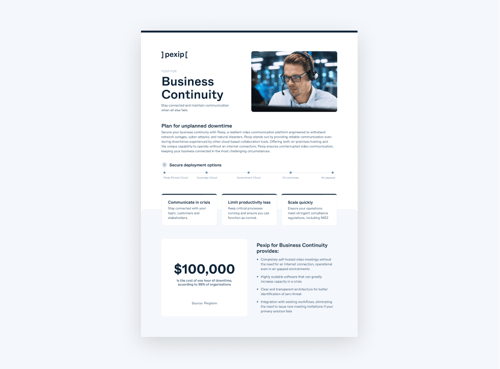
Northern Sydney Local Health District
The Northern Sydney Local Health District uses Pexip telehealth solutions to support intensive care, aged care, and outpatient services

About Northern Sydney Local Health District
The Northern Sydney Local Health District (LHD), part of NSW Health, provides health services to the approximately 850,000 Northern Sydney, Australia residents, from the Harbour to the Hawkesbury River. The district includes five hospitals and multiple community health centers.
Challenges
- Critically ill patients needed to talk with their families during Covid-19 restrictions safely
- The need for some patients to be able to access medical care and advice remotely, including those in residential health facilities
- Need for new parents to safely access medical advice without putting themselves or their children at risk
Pexip solutions
- Adoption of a new, custom telehealth solution using Pexip's self-hosted Infinity video solution and virtual meeting rooms
Results
- Gave patients a way to safely stay in touch with (and sometimes say goodbye to) loved ones while in the hospital
- Helped regional and rural patients access health care services without long travel times and other travel-related expenses
- Allowed immuno-compromised patients to stay safe while still accessing medical care and advice
- Gave new parents a safe and convenient way to access healthcare for their children
- Greatly improved convenience for patients
Challenges
The Northern Sydney Local Health District (LHD), an extensive healthcare network serving hundreds of thousands of residents, was looking for a way to quickly and safely communicate with patients (and allow patients to connect with their loved ones) while maintaining social distancing measures during the Covid-19 pandemic.
Four types of patients needed particular care and access to video communication:
- Critically ill patients in hospitals, and especially in Intensive Care Units (ICUs) who needed a way to communicate safely with family and loved ones without breaking quarantine regulations
- Patients in residential healthcare facilities who needed a way to communicate remotely with doctors and other health professionals
- New parents who needed a way to access health care and advice without exposing their children to health risks in a hospital or doctor’s office
- Patients in rural/distant locations who needed a way to access health care without traveling long distances and incurring hefty travel expenses
Working with Pexip, the Northern Sydney Local Health District created multiple customized solutions to provide remote health services, combining telehealth and video conferencing to make their healthcare services safe, efficient, and accessible.
-2.jpeg?width=1000&height=666&name=ICU%20photo%20(1)-2.jpeg)
Why Pexip?
For intensive care patients, the LHD and Pexip provided computers and installed webcams at each bedside so patients can call their loved ones and receive video calls when they want to, without scheduling. Pexip's solutions were well-suited to this use case because of the technology's flexibility and ease of use. Staff were trained in video conferencing software and were on hand to ensure patients, including those with Covid-19, could remain connected to the outside world.
At residential facilities, Pexip and LHD set up a system where appointments over Pexip video can be arranged with clinicians, doctors, or consultants when a resident is acutely unwell. Pexip's solutions are accessible across different devices and browsers, making it a good choice for this type of telehealth, where multiple other users are involved.
"This can be a very efficient way to connect clinicians with an elderly patient who is feeling unwell," says Emily Gregg, Telehealth Project Officer at the LHD. "We can keep our residents in a calm, familiar environment while getting them prompt clinical attention. At the same time, the video consultation provides the medical specialist with visual feedback and information, enabling them to make decisions and provide a responsive care plan quickly."
Another critical area where the LHD has seen positive outcomes using Pexip video communications has been remote telehealth. Previously, rural and regional patients may have had to travel long distances to attend clinical appointments.
Video consultations delivered via Pexip now mean that those who need to see a particular specialist can do so without needing to travel. And for new parents at home with young children, early childhood services such as occupational therapy and speech pathology can also be delivered via Pexip video consultations.
"Using video calls, we can continue to ensure that children are attended to in the safety and security of their own home while receiving services critical to their development," Gregg explains.
"Easy to use. With one click, they can connect their unwell patients with families, friends, and, where necessary, other consultants within the health service."
Northern Sydney Local Health District
Results
Pexip-powered telehealth services through the Northern Sydney Local Health District have been available since April 2020, and the feedback from patients and staff has been very positive.
For patients worried because they are immuno-comprised, video consultations using Pexip mean they don't have to be concerned about infection or illness they might otherwise come in contact with outside their home.
"We've seen excellent uptake of video consultations by endocrinology patients or those who have had renal transplants and need ongoing care," Gregg says. "Before all types of medical intervention, it's important that patients are as healthy as can be. For patients worried about Covid or the possibility of general infection, having a video consult from a familiar place, without traveling or visiting new environments, can provide peace of mind."
While Covid-19 may have facilitated an escalation of telehealth services, Gregg suspects video consultations are here to stay.
"We survey patients regularly, and from our sample of 2000 respondents to date, the #1 benefit we hear from their feedback is that they've found accessing their healthcare using video convenient."



